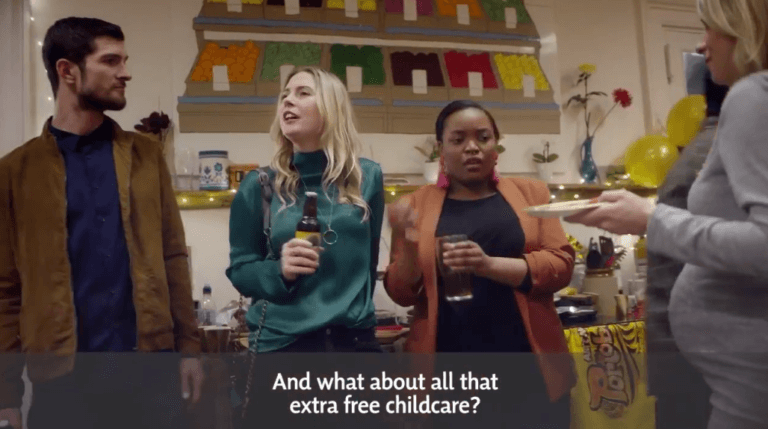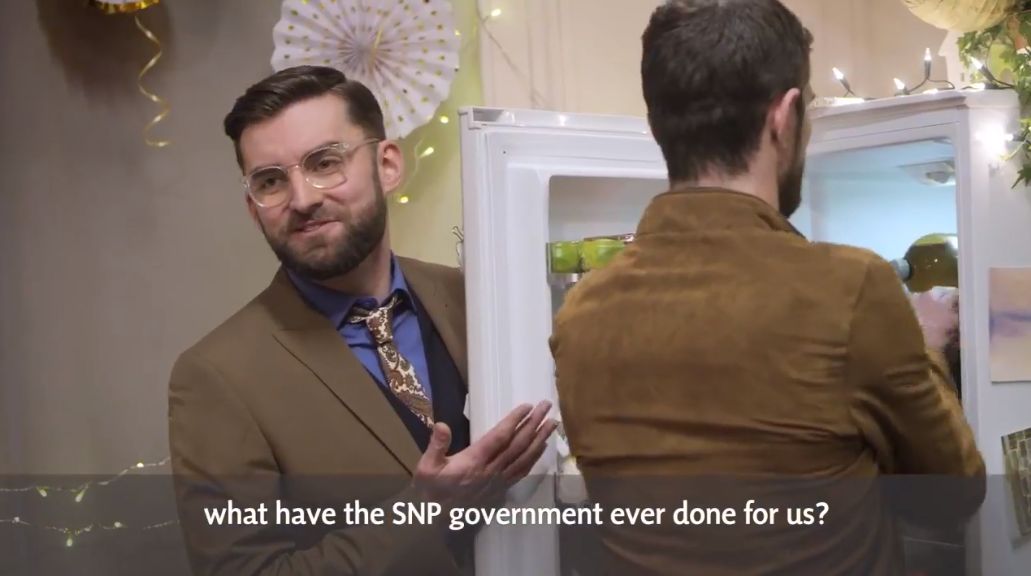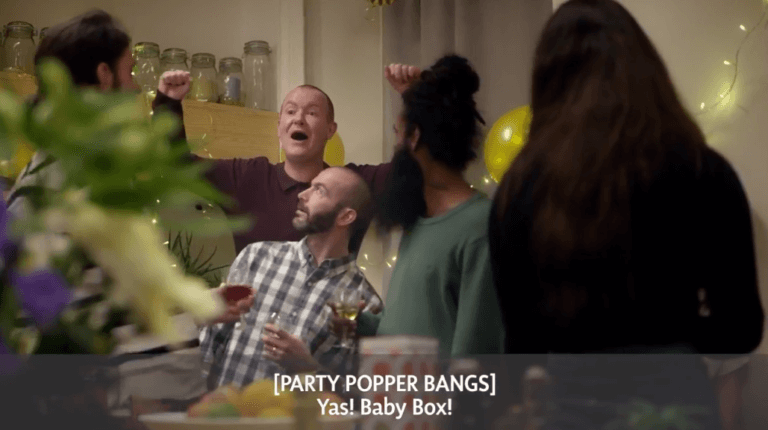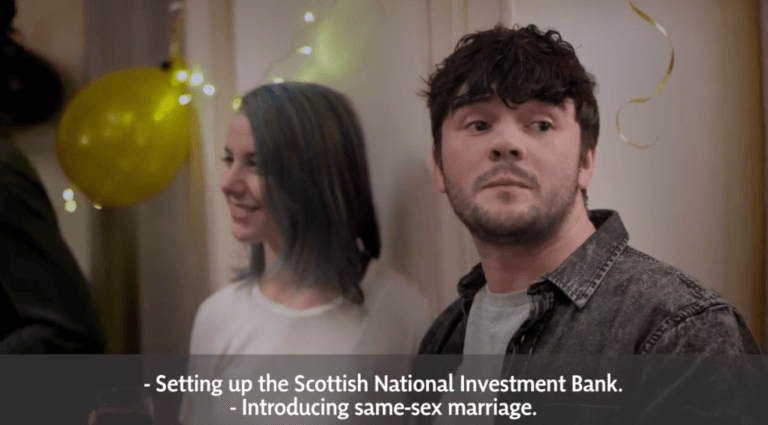The SNP’s party political broadcast has caused some debate in Scottish politics, with the party making some significant claims about their achievements in government.

The advert featured a man asking friends at a party, “what have the SNP ever done for us?”
His fellow revellers then give nineteen specific examples of SNP policies which improved lives in Scotland. Ferret Fact Service checked all of them.
1. “They scrapped tuition fees.”
The partygoer’s claim that the SNP ended tuition fees is not entirely accurate. Up-front fees were abolished by Labour in Scotland (after Tony Blair’s government introduced them in 1998) under pressure from the Liberal Democrats and many students were exempted from the Graduate Endowment scheme the then coalition put in place.
The SNP can, however, accurately say it introduced free university education by scrapping the graduate endowment. This took place in 2008, as part of the Scottish Government’s pledge to return to “free university education”.
The scrapping of the scheme passed through the Scottish Parliament by 67 votes to 61, after forming part of the SNP’s 2007 election manifesto.

2. “They built or done up loads of schools. 750 I think.”
This claim is based on figures from the annual Summary Statistics for Schools in Scotland report.
It provides data on the number of schools which have been built or refurbished each year. The latest report found that 100 schools fell into this category in 2016/17.
Since 2007, when the SNP entered government, there have been 751 schools built or refurbished according to the report. Until 2016, 168 of these had been funded via Private Finance Initiative (PFI) or Non-Profit Distributing (NPD) schemes.
Between 1999 and 2007, 328 schools were built or refurbished.
Schools are included in the data if the build or refurbishments cost £500,000 or more for primary, and £1m or more for secondary and special schools.
The costs are covered by local authorities, unless they are part of the Scottish Government’s Schools for the Future programme.

3. “What about all that extra free childcare?”
Free pre-school childcare was introduced after the Standards in Scotland’s Schools Act in 2000, which made it a requirement for local authorities to provide childcare for three and four year olds, and prevented authorities from charging fees. From 2002, local authorities provided 412.5 hours of care for each child per year.
This was increased to 475 hours in 2007, with the SNP having promised to “increase the provision of free nursery education for 3 and 4 year olds by 50 per cent”.
In 2014, the number of hours was extended again to 600, this time covering three and four year olds and 15% of two year olds. The Children and Young People (Scotland) Act increased the free provision, which now “equates to around 16 hours per week during school term time”.
The Scottish Government has pledged to increase the provision of free childcare to 1140 hours per year by 2020, covering children who are 3 or 4 years old, and 2 year olds who qualify.

However, there has been criticism of the practical effectiveness of the childcare provision, a report by campaign group Fair Funding For Our Kids found that many council nurseries were underfunded and only offered half-day places, which leads to many working parents being unable to access the childcare.
The report stated that “council nurseries do not currently have sufficient capacity to deal with the number of children entitled to a free place” and described the current system as a “haphazard
patchwork of childcare”.
The charity also criticised the lack of available data on how many children are actually receiving their entitlement. Research from the group and the Scottish Government suggests one in five children may not be receiving the free allowance.

4. “And they completed 70,000 new affordable homes.”
The Scottish Government’s Programme for Government for 2017/18 included a commitment to make 50,000 affordable homes available in the five-year period of this parliament.
There is no set definition of what affordable housing is that is used by the Scottish Government. Scottish Planning Policy defined in 2010 it as “housing of a reasonable quality that is affordable to people on modest incomes”. This has informed local authority planning on housing and been cited in many council reports.
Yearly Scottish Government housing statistics show that since 2007, there have been 70,861 homes completed under the Affordable Housing Supply Programme.
Of these 48,813 are available for social renting, provided by councils or registered social landlords (RSLs).
Housing charity Shelter said in a 2015 report that Scotland required 12,000 new affordable homes each year to keep up with demand.

5. “The small business bonus!”
The small business bonus scheme gives relief on property taxes for businesses which have a rateable value of £35,000 or less. This means many small businesses in Scotland pay no rates on their premises. It was introduced on April 1, 2008 by the Scottish Government.

6. “Record health spending?”
The Scottish Government announced an increase of around £400m for the Scottish health budget in 2017/18. This is equivalent to 43 per cent of the overall Scottish budget in 2016/17.
This is the highest ever figure for yearly government spending on the NHS in Scotland.
Yearly spending on the NHS in Scotland is detailed in the General Expenditure and Revenue Scotland (GERS) report.
However, this has been the case in each year since 1999, when the Scottish Parliament was set up and Scotland gained control over health spending. There have been fluctuations up and down from 2008/9 when spending is adjusted for inflation, however so-called ‘real terms’ spending increased year-on-year since from 2012/13.
The current budget cash increase is actually a 0.1 per cent decrease in ‘real terms’ funding. Audit Scotland found this was mainly explained by a drastic decrease in capital spending attributed to the completion of two hospitals. The capital budget covers one-off projects, while day-to-day spending is covered by the revenue budget.
While spending on the NHS has continued to increase, operating costs have also grown for NHS health boards across Scotland. This led to boards having to make “unprecedented levels of savings in 2016/17”, according to Audit Scotland.

7. “And 12,000 more working in the NHS.”
NHS staff numbers are provided every quarter, and the latest figures reveal that on September 30, 2017, there were a total of 162,695 staff. Adjusted for those who work-part time gives a whole-time equivalent (WTE) of 139,492 NHS workers in Scotland.
In 2007 when the SNP entered government for the first time, there were 127,062 WTE.
Under the SNP government, NHS Scotland whole-time equivalent staff have increased by 12,430. This follows the trend of increases in staff numbers in NHS Scotland from at least 2002.
The number of workers in the NHS decreased from a historic high in 2009, and did not surpass the figure until the 2014 figures were released. This has been attributed to the effect of the global economic downturn.

8. “And they scrapped the prescription charges.”
Prescriptions on the NHS were initially free across the UK, but were introduced in 1952 after concerns over funding the service. They were briefly stopped between 1965 and 1968, but have continued in England since then.
The first of the UK nations to end the charges was Wales, which brought in legislation to make prescriptions free in April 2007.
The Scottish Government followed suit in 2011, after a gradual reduction in the charges over the preceding four years. This had been an SNP pledge during the 2007 Scottish Parliament elections.
The party’s manifesto promised they would “immediately abolish prescription charges for people with chronic health conditions, people with cancer, and people in full time education or training. We will phase out prescription charges for the rest of the population by 2012.”

9. “230,000 modern apprenticeships?”
The Scottish Government oversees the modern apprenticeship scheme, and the programme is delivered by Skills Development Scotland.
Modern apprenticeships are aimed at those over 16 looking to gain vocational qualifications.
Figures for the numbers of new apprentices each year are provided quarterly. Since 2006/7 and including the most up-to-date statistics which cover up to the second quarter of 2017, 238,664 have started apprenticeships in Scotland.

10. “All those extra bobbies on the beat.”
There were 17,250 full-time equivalent police officers in Scotland’s force, according to the latest figures in November 2017. This is an increase of just over 1,000 since the SNP got into power in 2007.
The SNP have stuck to their manifesto promise to increase overall police officer numbers by 1,000, but there has been a slight reduction since 2013.
There have also been significant cuts to administrative support staff over the course of the SNP government. However, there is also no solid evidence that there are more police ‘on the beat’ (i.e. frontline duty)
The Scottish Government does not publish figures on frontline numbers, and Police Scotland says that all police officers have potential frontline duties.

11. “What about the baby boxes for all new mothers?”
The Scottish Government started rolling out the baby box to new mothers in August 2017. It was announced by Nicola Sturgeon in 2016, taking inspiration from a similar scheme in Finland.
The box contains essentials for a newborn baby including clothes, nappies, blankets and books. The box itself comes with a mattress and fitted sheet so can be used as a cot.

12. “And they banned fracking.”
Hydraulic fracturing, or fracking, is the practice of drilling for gas underground and extracting it with high-pressure water jets.
It has been a controversial practice across the world, and a number of companies have suggested using the technique to extract hard to reach shale gas from Scotland.
A British Geological Survey report on shale gas in Scotland found what the UK Government described as “modest reserves”.
Chemicals company Ineos holds fracking exploration licences for areas in Scotland, and has shipped shale gas to its Grangemouth plant from the US.
After pressure from campaigners, the SNP announced a moratorium on unconventional oil and gas development in 2015, which covered “hydraulic fracturing and coalbed methane extraction”
In their manifesto in 2016, the party pledged they would outlaw fracking unless “it can be proven beyond any doubt that there is no risk to health, communities or the environment”. A vote in the Scottish Parliament to support an outright ban passed 32 votes to 29, with SNP members abstaining.
In 2017, energy minister Paul Wheelhouse announced the moratorium would be extended indefinitely, effectively banning the practice.

13. “Setting up the Scottish National Investment Bank?”
A national investment bank is a state-owned lender which provides money for businesses and innovation, and can take a long-term view, without requiring an immediate return on investment.
The idea has been proposed in Scotland a number of times, including by think-tank The Common Weal, and was a feature of Scottish Labour’s 2017 manifesto for the general election.
Plans to set up a Scottish National Investment Bank were announced by the SNP in their 2017 Programme for Government. It was described as aiming to provide investment to help with “innovation and accelerating the transformation to a low carbon, high-tech, connected, globally competitive and inclusive economy”.

14. “Introducing same-sex marriage.”
Same-sex marriage was passed into law in Scotland in 2014. The Marriage and Civil Partnership (Scotland) Act 2014 received Royal Assent on 12 March that year and the first ceremonies began in December.
After a 2009 petition to the Scottish Parliament from the LGBT Network, a consultation was launched on legalising same-sex marriage in Scotland.
The Scottish Government put forward a view in favour of the move, saying: “We tend towards the view that religious ceremonies for civil partnerships should no longer be prohibited and that same sex marriage should be introduced so that same sex couples have the option of getting married if that is how they wish to demonstrate their commitment to each other.”
The legislation was take forward in 2012, and the act passed through the Scottish Parliament by 105 votes to 18.
Scotland introduced same-sex marriage slightly after England and Wales, where the first marriages took place in March 2014.
15. “Dinnae forget about the free personal care for the elderly.”
Free personal care for the elderly refers to different types of assistance that those over the age of 65 are entitled to free of charge. This includes “assistance with personal hygiene, eating and drinking, immobility problems, management of medication and personal safety”.
According to the Scottish Government, nearly 78,000 older adults use free personal care. This is around eight per cent of the over 65 population in Scotland.
The roots of the policy predate devolution in Scotland. In 1997, the opposition Labour Party pledged to establish a Royal Commission to explore the funding of long-term care. Once elected, this commission was convened and delivered a damning report on the state of long-term care in the UK.
The commission said care should be split into different types of costs: living costs such food, clothing and heating, housing costs (i.e. rent, mortgage payments and council tax) and personal care costs, which they defined as the extra cost of being looked after due to frailty or disability.
The report further recommended that personal care should be free for those in need and should be paid through general taxation.
When the Scottish Parliament was created after devolution in 1999, the issue of free personal care became a political issue, with broad support across the parliament.
The Labour-led coalition government initially rejected the plan, but after coalition partners the Liberal Democrats put forward a motion to implement free personal care, First Minister Henry McLeish backed the proposal.
In 2001 the Scottish Executive announced its decision to launch free personal and nursing care. It would include people aged 65 years and over, and give free nursing care in care homes for people of all ages.
It was finally passed under the Labour-Lib Dem coalition in 2002 as part of the Community Care and Health (Scotland) Act.
The policy continued as the SNP entered government in 2007 and remains in place to this day.
16. “Protecting their free bus passes.”
The elderly and disabled concession bus pass was launched on April 1 2006 by the Labour-led coalition at Holyrood. It is currently used by over one million people in Scotland.
In 2017, the SNP government launched a consultation into the future of the concession, with changing the future eligibility one of the options being examined.
Transport minister Humza Yousaf told the BBC in January 2017: “Clearly people are living longer, they are staying in work longer – which are all good things – but it does add a pressure.
“So we will consult on the long-term sustainability of the national concession travel scheme and we look forward to hearing people’s views.”
In answer to a question in the Scottish Parliament, the First Minister refused to confirm that eligibility would not change.
The SNP has protected those who are currently eligible for a concessionary bus pass and has promised that no-one who currently receives one will have their pass removed.
17. “And they got rid of the bridge tolls.”
The Scottish Government ended tolls on the Forth Road Bridge and Tay Bridge in February 2008. Scrapping these remaining bridge tolls had been a pledge in the SNP’s 2007 manifesto.
Payments for crossing the Skye Bridge and Erskine Bridge were scrapped in 2004 and 2006 by the previous Scottish Executive.

18. “Built the Queensferry Crossing!”
The bridge was formally announced by John Swinney in a speech to MSPs in 2007. The building project started in 2011 and the Queensferry Crossing was completed and opened in September 2017.
19. “And the Borders Railway.”
The SNP cannot accurately claim credit for the Borders Railway. A feasibility study on reconnecting the area to the rail network was actually launched in 1999 by then-First Minister Donald Dewar.
The project was given Royal Assent after a 114-1 vote in the Scottish Parliament in 2006, under the Labour-Liberal Democrat coalition government.
Initially called the Waverley Railway it was renamed in 2008 as the Borders Railway and construction began in 2012, by which time the SNP were in power at Holyrood. It opened to passengers in 2015.

Ferret Fact Service (FFS) is a non-partisan fact checker, working to the International Fact-Checking Network fact-checkers’ code of principles. All the sources used in our checks are publicly available and the FFS fact-checking methodology can be viewed here. Want to suggest a fact check? Email us at factcheck@theferret.scot
In response to an FFS evidence request, the SNP provided links to relevant reports and data for all of the 19 claims.
Images from SNP party political broadcast ‘What has the SNP ever done for us?’
Correction: An earlier version of this fact-check stated that the Waverley Railway (Scotland) Act passed with 141 votes for to one against. This has been corrected to 114 votes for to one against.

















SNP-bads
1. EARL scrapped and Edin Tram Project diverted into EDI-Airport substitute
2. GARL cancelled still not replaced
3. EGIP eroded and budget-raids
4. over-ruled Aberdeenshire planners on Trump’s Menie golfcourse
5. gaelic signposts and no support for other native languages (Doric, Lallans, Border-scots, Brythonic-scots
6. gaelic school in Edinburgh which has much bigger educational issues to address, belongs in Inverness or Highland Region
7. no gaelic option or translation in official documents (cf Welsh in UK docs.)
8. Fix Transport Scotland, money for roads, anti-rail
9. illogical policy of ‘educational convergence’ should be ‘pursuit of excellence’
Re: points 15 and 19 – continuing to fund and actively promote and support a policy or realising and bringing to fruition a project initiated by someone else, is in my opinion equal to “doing things for us”.
Not doing things for the people? –
Well, just look at how the Tories have torn things down since gaining a majority at WM. Or look at how the Trump administration is dismantling the US state organs and judiciary.
Did Lab/Lib provide the money for the Borders Railway?
By any objective assessment that’s a fairly decent ‘report card’ for any administration. Even if the only completely false claim is debatable in my opinion.
Nonetheless, any assessment of performance should be objective and be applied across the board. Thus were the same criteria to be applied to the British Government one would be satisfied. However, as Brexit has shown this would be wishful thinking in the extreme.